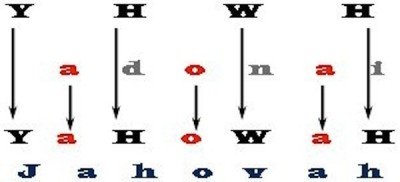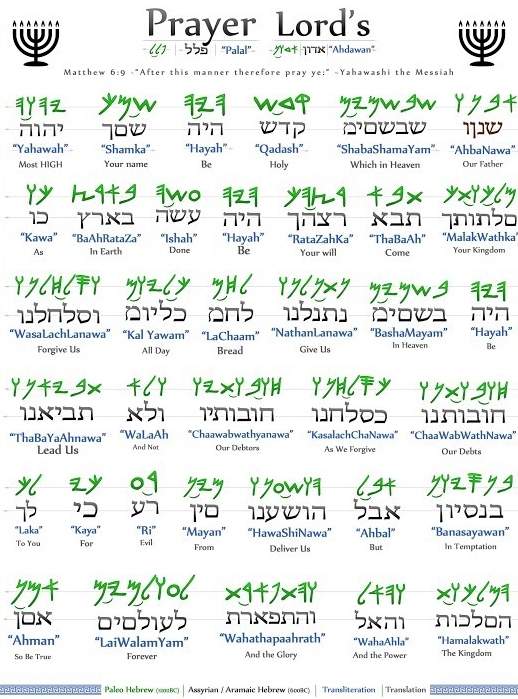Our Father
September 12, 2021Today's message was the first in a 6-part series about the Lord's Prayer. Today was an introduction to the series and a closer look at the first part: "Our Father, who art in heaven, hallowed be thy name." The message is here (starting about 26:00).
God's Name
Let's go off on a tangent of sorts right off the bat. Pastor Patrick mentioned that God's name is a combination of consonants from Yahweh and vowels from Adonai. Let's add to that a little. The only time in the Torah that God answers the question "what is your name?" occurs in Exodus 3:14. God's response to Moses is, in short, "I am." Several translations could all be correct: " I am what I am," "I am whom I am," etc., but they all boil down to "I am" (or Being or Will Be). Hebrew does not have a present tense for the verb to be. God has lots of names in the Torah, like Elohim (universal god[s]) and Adonai (lord), and lots of other gods were called those as well. But, only the God of the Torah is called "I am." The Hebrew in Exodus that God uses to call himself is eh-yeh spelled with similar consonants (aleph [a silent consonant], hey, yud, hey; AHYH), but not exactly the same as YHWH (yud, hey, waw(vav), hey). YHWH is known as the tertragrammaton and may be pronounced Yahweh (Jewish tradition is to pronounce it as Adonai or Elohim because of the vowels assigned, or not at all). Jehovah came from the Latin translation of YHWH where yud(y) becomes j and waw(w) becomes v. There is no j sound in Hebrew. V and W were often confused.
The "correct" pronunciation of YHWH (יהוה) from the Torah is not known. The original manuscripts had no vowels anywhere. Vowels were added by the Masoretes in the 5th-10th Centuries A.D. to standardize the pronunciation. It is interesting to note that their vowel system was designed in such a way that the original consonant-only texts were not changed at all, even in the slightest, by adding the vowels - the original was too holy.
Further, the eh-yeh is what God told Moses His name was, but God told Moses to tell the Israelites that his name is YHWH (Exodus 3:15), much less sophisticated and more acceptable to the ancients than "I am what I am."
Here's a graphical representation, starting with ey-yeh (I am, AHYH):
A H Y H
From the above line to the next is sometimes refered to as a play on words.

Each step above is a leap-of-faith, of sorts, such that by the time you get to Jehovah I think you're way off the mark. I'd stick with Yahweh for an English "equivalent." Those are at least the right consonants.
Below is how it looks in Hebrew. Hebrew reads right to left. The consonants from YHWH (black on the left) and the vowels from Adonai (red on the right) are merged. You'll note the merger is not exact, you can't just use the middle word which is exactly the consonants of YHWH (black) and exactly the vowels of Adonai (red). The first vowel (on the right) of Adonai has to be adjusted in order to be used with the consonants of YHWH according to Hebrew language rules. The resulting word (far left) was to be pronounced according to the vowels, not the consonants, so when you saw YHWH consonants with Adonai vowels, you simply said Adonai (Lord). Or, if the vowels of Elohim were used with the consonants of YHWH (not shown here) you simply said Elohim (God).

We have no idea what vowels were used with the original YHWH. When you see "God" or "Lord" in the Torah, it probably came from either YHWH with the Elohim vowels (God) or YHWH with the Adonai vowels (Lord). And just for another tidbit of info... In synagogues today you'll often hear God refered to as Ha-Shem, "The Name."
Ok, back to the more meaty issues...
Father
Names were meaningful in the Torah. "Leah" meant "delicate," the plain sister of Rachel who was Jacob's first choice as a wife. "Abraham" means "father of multitudes." And on and on. God has the most meaningful name of all, "I am." He is everything, and everything is from Him. Everything in this world is dependent on Him. God exists unconditionally.
The Torah is all about family, however dsyfunctional most of them are (which teaches valuable lessons). Familial relationships were very important. Take "Honor your Mother and Father," for instance. In many ways, honoring your parents leads to honoring God. The late Bronze Age people would not have put any god in the category of any father in the familial sense. Refering to God as a Father and implying characteristics of a relationship would have been unheard of, totally a foreign (or even non-existent) idea. So, the Torah teaches that God is like a father.
On September 6-7, 2021, the Jewish world celebrated Rosh Hashanah, the Jewish New Year (actually the world's new year on the anniversary of Creation). One of the many blessings of this holiday is "Avinu Malkeinu" which means "Our Father Our King," the same parallel Pastor Patrick noted in his message. "Av" is the Hebrew word for father (the "inu" at the end is the "our" part). "Abba" is often used to mean father, too, but that's more Aramaic. They are related, most likely, as the v-sound in "av" is depicted by bascially the same character for the b-sound in Hebrew.
In the Torah, God is love. But God also has many other attributes like justice, truth-centered, creator, and nurturer. Just like God, a father is about more than just love, a father has to raise his kids, not be their pal. Interestingly, this is why people are commanded to honor their parents, not commanded to love them. This notion leads to this understanding, "be prepared to be corrected." God is disciplinarian as well. See Deuteronomy 8:5 for mention of Father (God) with discipline and nurture in mind.
Hallowed/Holy
Mentioned earlier was the notion of a name being meaningful. Hallowed expands on the meaning of, or the character of, to whom we're praying. God's character, his meaning to the world, is "set apart" from the world. In Hebrew, sanctified and holy are one word, ka-dosh, meaning set apart. We proclaim God is holy. Separating God from all the pagan gods is a big theme in the Torah. So is separating humans from the rest of Creation, male from female, things of-life from things of-death, and more.
Why Pray
What about the bigger topic of prayer? Why do it? What's the goal? I listened to a talk by Dennis Prager that outlined Judaism's approach to prayer. He maintains the overriding thought is that prayer primarily is to affect the one praying. The Hebrew verb (פלל, paw-lal) to pray is reflexive - a type of verb that does not exist in English, but does in other languages. Built into the reflexive verb is the doer doing it to himself. The verb paw-lal literally means to examine or judge oneself. Here are the four types of prayer offered by Prager:
1. Petition. Asking for something. Least important and most risky. Can lead to great disappointment in God and ultimately can lead to atheism. Communal petition for all or for society, however, is AOK but a small part of Jewish prayer books.
2. Praise. Recognizing something higher than self. Prayer is for us to reflect on and praise God the Creator, sustainer of life, etc. God does not need anyone's praise. Each of us, however, needs to remind ourselves who's in charge, in prayer.
3. Thanks/Gratitude. Which leads to Happiness. "Thank you for _____." It's also a recognition of God's blessedness and sovereignty. Many Jewish prayers start with "barach ata Adonai," "blessed are you Lord." Barach literally means bended knee.
4. Affirm the Jewish purpose, which is to build God's kingdom on earth. "May the day come when all know you are God." To bring the world to God. Praying this reminds Jews (and Christians) of their purpose.
Who art in Heaven
Two thoughts to save for another time... Where is God? Is there an afterlife? The Torah is fairly clear about the former, less so about the latter. But there are clues to both.

Paleo Hebrew
Biblical Hebrew (no vowels)
Transliteration (what it sounds like)
Meaning (in English)
YHWH is the upper-left word.